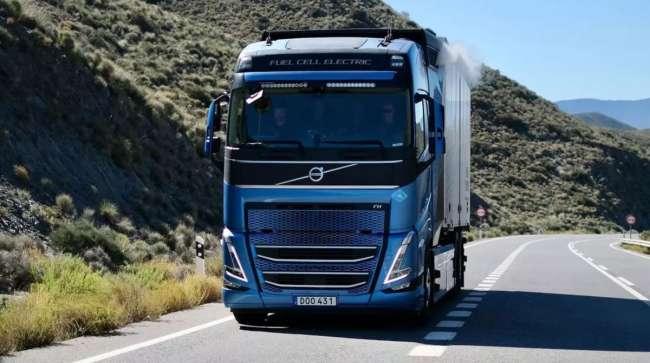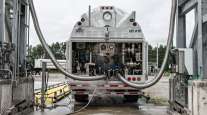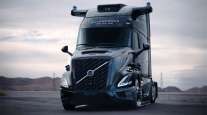Staff Reporter
Volvo to Begin Customer Hydrogen ICE Truck Tests in 2026

[Stay on top of transportation news: Get TTNews in your inbox.]
Volvo Group plans to begin testing trucks with hydrogen-powered internal combustion engines with customers in 2026 and launch commercial production toward the end of the decade, the parent company of Volvo Trucks North America and Mack Trucks said May 23.
The timeline for the development of the trucks as part of a multipronged decarbonization push lays out the path for the Swedish truck giant’s joint venture with Westport Fuel Systems publicly for the first time.
Volvo and Westport’s JV is expected to become operational in the second quarter of this year. Early in May, the JV received European Commission approval. The companies formalized the partnership in March after inking a nonbinding letter of intent in July.
“Trucks where the traditional internal combustion engine remains but runs on hydrogen will have the same performance and reliability as our diesel trucks, but with the added benefit of very low carbon dioxide emissions. They will be a valuable complement to our battery-electric trucks, which have been on the market for several years,” said Jan Hjelmgren, Volvo Trucks head of product management and quality.
We have signed an agreement with @WestportDotCom to establish a joint venture to reduce CO2 emissions from long-haul transport. Together, we will accelerate the commercialization and global adoption of Westport’s High Pressure Direct Injection (HPDI) fuel system technology. pic.twitter.com/yaX9ozQSuG — Volvo Group (@VolvoGroup) March 11, 2024
The High Pressure Direct Injection fuel system developed by Vancouver, British Columbia-based Westport involves a small amount of ignition fuel being injected with high pressure to enable compression ignition before hydrogen is added.
Volvo sees HPDI’s advantages as higher energy efficiency with lower fuel consumption, and increased engine power. Trucks using powertrains with HPDI will be categorized as a “zero-emission vehicle” under European Union carbon dioxide emissions standards, the company added.
Hydrogen internal combustion engine trucks will sit alongside hydrogen fuel cell electric vehicle trucks in Volvo’s portfolio. Hydrogen is one of three strands in the company’s multipronged path to decarbonizing its vehicles.
The company is currently carrying out internal tests of the FCEV trucks ahead of the start of customer testing in 2025, a spokesman said May 20.
Volvo expects all the new trucks it sells to be zero-emission vehicles by 2040.
“It’s clear that several kinds of technology are needed to decarbonize heavy transport. As a global truck manufacturer, we need to support our customers by offering a variety of decarbonization solutions, and customers can choose their alternative based on transport assignment, available infrastructure and green energy prices,” said Hjelmgren.
Green hydrogen can play a major role alongside battery electrification and other renewable fuels in creating the carbon-neutral societies of tomorrow. We are getting ready for hydrogen! pic.twitter.com/rLD3Ho3dDy — Volvo Group (@VolvoGroup) April 22, 2024
The company’s decarbonization plans also involve internal combustion engine trucks consuming biodiesel and hydrotreated vegetable oil. On May 16, the company said all of its range of European trucks — the FL, FE, FM, FMX, FH and FH16 — were now able to run on 100% biodiesel.
In North America, all newly assembled Class 8 tractors rolling off Volvo Trucks North America and Mack Trucks production lines are now set to depart manufacturing facilities with HVO or renewable diesel in their fuel tanks, they said April 24.
HVO, which does not require engine modifications, is produced from renewable sources such as waste vegetable oils and animal fats. It has the same chemical structure as regular diesel, so can be used as a direct replacement.
VTNA said it plans to fuel new trucks leaving its New River Valley Assembly Operations in Dublin, Va., with 20 to 25 gallons of HVO per tank.
Want more news? Listen to today's daily briefing below or go here for more info:




